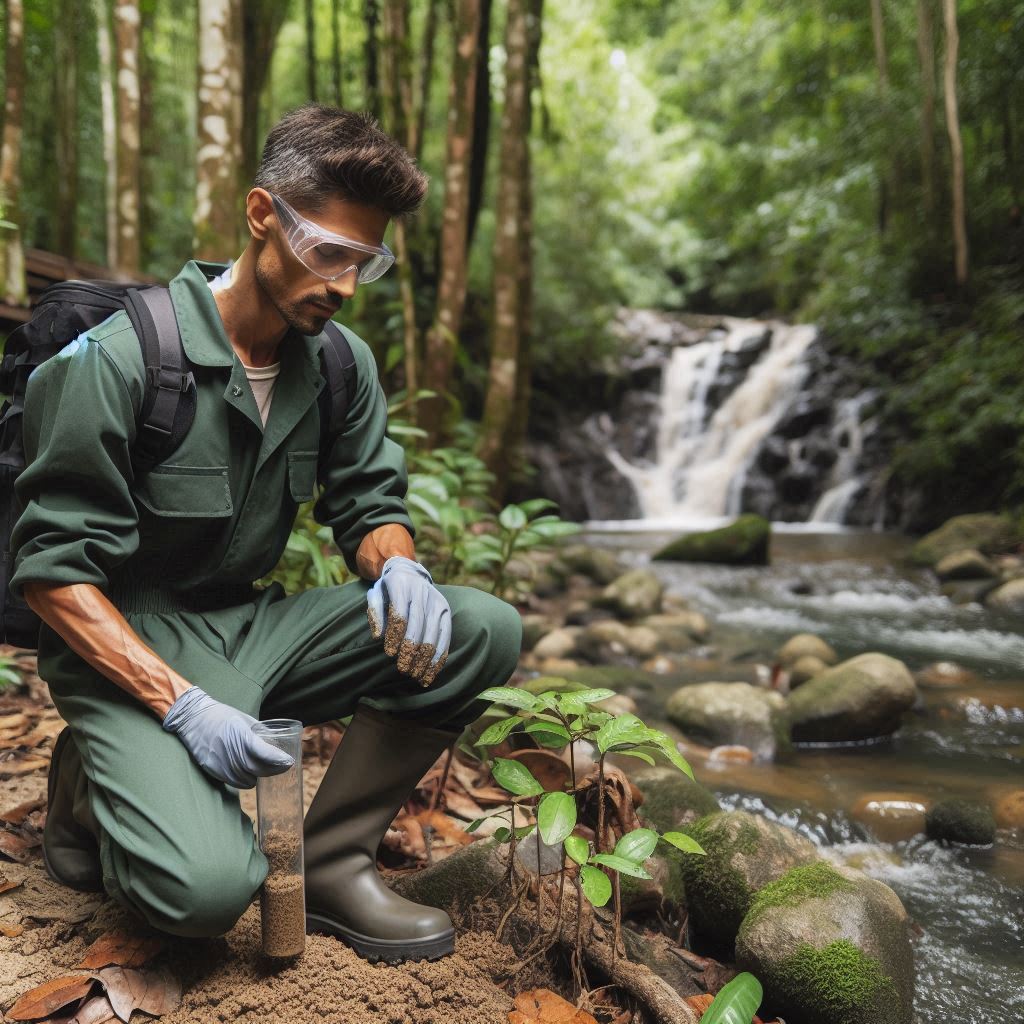Introduction
Brief Overview of the Role of an Environmental Technician
An environmental technician monitors and protects the environment.
They inspect sites, collect samples, and analyze data.
Their work ensures compliance with environmental regulations.
They help identify pollution sources and recommend solutions.
Technicians work in various settings, including labs and field sites.
They use specialized equipment to measure air, water, and soil quality.
Their role is crucial for maintaining environmental health and safety.
Importance of Environmental Technicians in Preserving and Protecting the Environment
Environmental technicians play a key role in environmental preservation.
Their efforts help reduce pollution and manage waste.
They ensure that industries follow environmental laws and standards.
By identifying contamination sources, they prevent further damage.
Their work supports sustainable practices and promotes public health.
Technicians also contribute to environmental research and development.
They help organizations implement eco-friendly practices.
Their expertise is vital for protecting natural resources and habitats.
Purpose of the Blog Post to Provide Detailed Job Description Details for Aspiring Environmental Technicians
This blog post aims to provide a comprehensive job description for aspiring environmental technicians.
Understanding the role’s requirements helps potential candidates prepare for the job.
We will detail the skills needed, daily tasks, and career prospects.
This information will guide those interested in this field.
By exploring these aspects, readers can make informed decisions about pursuing a career as an environmental technician.
This post serves as a valuable resource for career planning and development in the environmental sector.
Job Title and Responsibilities
Official title of an environmental technician
An environmental technician is responsible for conducting various tests to analyze environmental conditions and ensure compliance with regulations.
Primary responsibilities of an environmental technician
The primary responsibilities of an environmental technician include collecting samples, conducting tests, analyzing data, and documenting findings.
Specific tasks and duties involved in the role
- Collecting soil, water, and air samples from different locations.
- Conducting field tests to measure pollution levels and environmental impact.
- Analyzing samples in a laboratory setting to determine pollutants and contaminants.
- Interpreting data and preparing reports on environmental conditions.
- Implementing and monitoring remediation plans to address environmental issues.
- Collaborating with scientists and engineers to develop environmental solutions.
- Ensuring compliance with local, state, and federal regulations related to environmental protection.
- Providing recommendations for improving environmental quality and sustainability.
- Participating in environmental assessments and audits to evaluate potential risks.
- Training employees on environmental best practices and protocols.
An environmental technician plays a crucial role in protecting the environment and promoting sustainability through data collection, analysis, and compliance monitoring.
By performing various tasks and duties, they contribute to the preservation of natural resources and the prevention of environmental pollution.
Read: Surveying and Mapping Technician: Job Satisfaction
Educational Requirements
Environmental technicians play a vital role in protecting the environment and ensuring compliance with regulations.
To become an environmental technician, individuals need to meet certain educational requirements.
Common Educational Background Required for Environmental Technicians
- Typically, a high school diploma or GED is the minimum educational requirement for entry-level environmental technician positions.
- However, most employers prefer candidates with an associate’s or bachelor’s degree in environmental science, biology, chemistry, or a related field.
- Coursework in environmental regulations, hazardous waste management, soil science, and ecology is also beneficial for aspiring environmental technicians.
Certifications or Licenses That May Be Necessary
- Some environmental technician positions may require certifications or licenses, such as the Hazardous Waste Operations and Emergency Response (HAZWOPER) certification.
- Other certifications, such as the Certified Environmental Technician (CET) or Certified Hazardous Materials Manager (CHMM) credential, can enhance job prospects and credibility.
- State-specific licenses or certifications may also be mandated depending on the nature of the work and geographical location.
Importance of Ongoing Education and Training in the Field
- Given the evolving nature of environmental regulations and technologies, ongoing education and training are crucial for environmental technicians to stay abreast of industry developments.
- Attending workshops, seminars, webinars, and obtaining additional certifications can expand an environmental technician’s knowledge and skill set.
- Continuous learning not only enhances job performance but also demonstrates a commitment to professional growth and excellence in the field.
Read: Importance of Accuracy in Surveying and Mapping
Skills and Qualifications
Environmental technicians play a crucial role in safeguarding the environment.
To succeed in this role, specific skills and qualifications are essential.
Key Skills Needed to Be Successful as an Environmental Technician
Technical skills are vital for environmental technicians.
You must understand environmental laws and regulations thoroughly.
Knowledge of data collection and analysis is essential.
You will often work with specialized equipment, requiring technical proficiency.
Additionally, environmental technicians must identify pollutants and assess their impact on the environment.
They need strong problem-solving abilities to address environmental challenges effectively.
Precision and attention to detail are also crucial when conducting tests and recording data.
You should also be familiar with Geographic Information Systems (GIS) and other mapping software.
These tools are essential for tracking environmental data and creating reports.
A solid foundation in chemistry and biology is also beneficial.
Understanding how chemicals and biological agents interact with the environment is crucial for this role.
Moreover, the ability to interpret scientific data and present findings in a clear, concise manner is essential for effective communication.
Soft Skills That Are Beneficial for the Role
In addition to technical skills, soft skills play a significant role in an environmental technician’s success.
Strong communication skills are vital.
You must convey complex information clearly to both technical and non-technical audiences.
This is essential when writing reports or explaining findings to stakeholders.
Teamwork is another critical soft skill.
Environmental technicians often work in teams, collaborating with scientists, engineers, and other professionals.
Therefore, the ability to work well with others is crucial.
Time management is another valuable soft skill.
Environmental technicians often work on multiple projects simultaneously, requiring the ability to prioritize tasks effectively.
Adaptability is also important.
Environmental work can be unpredictable, and technicians must be ready to adjust to changing conditions.
Lastly, environmental technicians need a strong work ethic.
The role often involves fieldwork in challenging conditions, requiring determination and perseverance.
Previous Experience or Internships That Can Be Helpful
Previous experience can significantly enhance your qualifications as an environmental technician.
Internships in environmental science, biology, or chemistry provide valuable hands-on experience.
During these internships, you may work on real-world projects that involve data collection, analysis, and reporting.
This experience helps you develop the technical skills required for the role.
Working in related fields, such as laboratory research or environmental consulting, can also be beneficial.
Experience in these areas helps you understand the practical applications of environmental science.
Volunteering for environmental organizations is another way to gain relevant experience.
These opportunities allow you to work on environmental projects and build a network within the field.
Having experience with environmental regulations and compliance is also valuable.
Employers often seek candidates familiar with local, state, and federal environmental laws.
This knowledge helps ensure that projects comply with all necessary regulations.
In summary, a combination of technical skills, soft skills, and relevant experience is crucial for success as an environmental technician.
Read: Field vs. Office Work in Surveying and Mapping

Work Environment
Environmental technicians play a crucial role in maintaining a healthy environment for the well-being of all living organisms.
They work in a variety of settings and encounter different conditions while performing their duties.
It is essential for them to adhere to safety protocols to ensure their well-being and the protection of the environment.
Different Settings
- Environmental technicians may work in laboratories, conducting tests and analyzing samples to assess environmental quality.
- They can also work in the field, collecting samples from soil, water, and air to monitor environmental conditions.
- Some environmental technicians work for government agencies, implementing and enforcing environmental regulations.
- Others may work for consulting firms, assisting businesses in complying with environmental laws and regulations.
Conditions Encountered
- Environmental technicians may encounter hazardous materials such as chemicals and pollutants while conducting tests and collecting samples.
- They may work in extreme weather conditions, such as heat, cold, or rain, to gather data for environmental assessments.
- Fieldwork can involve physical labor, including hiking to remote locations, carrying heavy equipment, and working in rugged terrain.
- They may also encounter wildlife such as insects, snakes, or other animals while working in natural environments.
Importance of Safety Protocols
- Safety protocols are crucial in the work environment of environmental technicians to protect their health and well-being.
- Proper training in handling hazardous materials and equipment is essential to avoid accidents and injuries on the job.
- Wearing personal protective equipment, such as gloves, goggles, and respirators, is necessary to prevent exposure to harmful substances.
- Following proper procedures for sample collection and testing helps minimize risks and ensures accurate results in environmental monitoring.
In general, the work environment of environmental technicians is diverse and challenging, requiring them to be diligent in following safety protocols to protect themselves and the environment they work to preserve.
Read: CAD Technician vs. Draftsman: Key Differences
Salary and Job Outlook
When considering a career as an environmental technician, one important factor to take into account is the salary and job outlook for this profession.
Salary Range for Environmental Technicians
The average salary range for environmental technicians can vary depending on factors such as experience, education, and location.
On average, environmental technicians can expect to earn between $35,000 to $60,000 per year.
Factors That May Influence Salary Levels
Several factors can influence the salary levels of environmental technicians.
Some of these factors include the level of education and certification, years of experience in the field,
specialized skills or expertise, and the size and type of the employing organization.
For example, environmental technicians with a bachelor‘s degree or higher may typically earn a higher salary compared to those with an associate degree or technical certification.
Likewise, obtaining specialized certifications in areas such as hazardous waste management or air quality monitoring can also increase earning potential.
Moreover, environmental technicians working in certain industries such as government agencies, consulting firms, or research institutions may command higher salaries compared to those working for non-profit organizations or small businesses.
Transform Your Career Today
Unlock a personalized career strategy that drives real results. Get tailored advice and a roadmap designed just for you.
Start NowJob Growth and Demand for Environmental Technicians
The job outlook for environmental technicians is generally positive, with an expected growth rate of around 9% over the next decade.
This growth is driven by increasing awareness of environmental issues, stricter regulations on pollution control, and the need for sustainable practices in various industries.
Environmental technicians play a crucial role in helping organizations comply with environmental laws and regulations, conducting environmental assessments, collecting samples, and analyzing data to ensure environmental compliance and sustainability.
As more industries and organizations prioritize environmental protection and sustainability, the demand for skilled environmental technicians is expected to rise.
This demand is especially high in sectors such as energy, construction, manufacturing, and waste management.
In review, the salary range for environmental technicians can vary based on factors such as education, experience, and industry.
With a positive job outlook and growing demand for environmental technicians, pursuing a career in this field can be rewarding both professionally and financially.
Read: CAD Technician Certification: What You Need to Know
Find Out More: Certifications for Environmental Engineers
Advancement Opportunities
Potential Career Paths for Environmental Technicians
Environmental technicians have a range of career paths to explore as they gain experience.
Many start as field technicians and can progress to supervisory roles.
With experience, they might transition into project management positions or environmental consultancy.
Specialized areas such as hazardous materials management or environmental compliance also offer career growth.
Advanced roles could include environmental health and safety managers or environmental engineers.
Technicians with leadership skills might oversee entire environmental departments or work for regulatory agencies.
Opportunities in research or academia are also possible for those interested in studying environmental science further.
Further Education or Certifications That Can Lead to Advancement
Further education and certifications can significantly enhance an environmental technician‘s career prospects.
Pursuing a bachelor‘s degree in environmental science, engineering, or a related field can open doors to advanced roles.
Certifications such as Certified Environmental Professional (CEP) or Certified Safety Professional (CSP) demonstrate expertise and commitment.
Specialized certifications in areas like hazardous materials handling or environmental impact assessment can also be valuable.
Advanced degrees, such as a master‘s or PhD, can lead to roles in research, teaching, or high-level consultancy.
Continuous learning through workshops and seminars can keep skills up-to-date and relevant.
Ways to Increase Skills and Expertise in the Field
Increasing skills and expertise is crucial for career advancement in environmental technology.
Gaining hands-on experience through various projects helps build practical knowledge.
Participating in professional organizations and networking with industry experts can provide valuable insights and opportunities.
Staying updated with the latest industry trends and technologies through journals and online courses is essential.
Volunteering for challenging projects or roles can showcase your capabilities and dedication.
Seeking mentorship from experienced professionals can offer guidance and career advice.
Regularly updating skills through certifications and training programs ensures ongoing professional development.
Challenges and Rewards
Challenges Faced by Environmental Technicians
- Lack of resources for conducting thorough environmental assessments.
- Resistance from industries or individuals who do not prioritize environmental conservation.
- Complex regulations and compliance requirements that vary across regions.
- Dealing with hazardous materials and potentially dangerous work environments.
- Pressure to meet tight deadlines while ensuring accuracy in data collection and analysis.
- Working in adverse weather conditions or remote locations that can be physically demanding.
- Constantly evolving technology and techniques that require continuous learning and adaptation.
Fulfilling Aspects of the Job
- Contributing to the preservation and improvement of the environment for future generations.
- Using scientific knowledge and skills to address pressing environmental issues.
- Seeing the direct impact of your work on the health and well-being of communities.
- Collaborating with diverse stakeholders, including government agencies, NGOs, and local communities.
- Opportunities for career advancement and specialized training in environmental management.
- Job stability and demand for skilled environmental technicians in various industries.
Strategies for Overcoming Obstacles
- Establish clear communication channels with stakeholders to address concerns and build positive relationships.
- Stay updated on regulatory changes and seek professional development opportunities to enhance skills.
- Utilize technology and software tools to streamline data collection and analysis processes.
- Develop time management skills to prioritize tasks and meet deadlines effectively.
- Practice self-care and wellness techniques to manage stress and stay motivated in challenging situations.
- Seek support from colleagues or mentors to exchange knowledge and experiences for continuous growth.
Overall, while being an environmental technician comes with its share of challenges, the rewards are significant.
By embracing these challenges head-on and implementing strategic solutions, environmental technicians can continue to make a positive impact on the world around them.
Gain More Insights: Marine Engineering: Education and Degree Requirements
Conclusion
Recap of the Key Points Discussed in the Blog Post
In this blog post, we explored the role of an environmental technician.
We discussed their primary responsibilities, including monitoring and managing environmental conditions.
Environmental technicians assess pollution levels, manage waste, and ensure compliance with environmental regulations.
They use various tools and techniques to gather data and analyze environmental impact.
Technicians work in various settings, such as laboratories, field sites, and industrial facilities.
Their role is crucial in maintaining ecological balance and public health.
Encouragement for Aspiring Environmental Technicians to Pursue Their Career Goals
If you are passionate about environmental conservation and scientific work, consider becoming an environmental technician.
This career offers opportunities to make a significant impact on the environment.
Gaining relevant qualifications and experience is essential for success in this field.
Pursuing a degree in environmental science or a related field can provide a solid foundation.
Internships and hands-on experience are invaluable for developing practical skills.
Stay updated with industry trends and advancements to enhance your expertise and career prospects.
Final Thoughts on the Importance of Environmental Technicians in Today’s Society
Environmental technicians play a vital role in today’s society.
They help protect natural resources and improve environmental quality.
Their work supports sustainable practices and helps combat environmental challenges.
As global environmental issues become more pressing, the demand for skilled technicians grows.
Their contributions are crucial in addressing climate change, pollution, and habitat destruction.
By pursuing a career as an environmental technician, you contribute to a healthier planet and a better future for all.
[E-Books for Sale]
The Big Book of 500 High-Paying Jobs in America: Unlock Your Earning Potential
$19.99 • 500 High-Paying Jobs • 330 pages
Explore 500 high-paying jobs in America and learn how to boost your career, earn more, and achieve success!
See All 500 High-Paying Jobs of this E-Book
1001 Professions Without a Degree: High-Paying American Jobs You Can Start Now
$19.99 • 1001 Professions Without a Degree • 174 pages
Discover 1001 high-paying jobs without a degree! Unlock career tips, skills, and success strategies for just $19.99!




